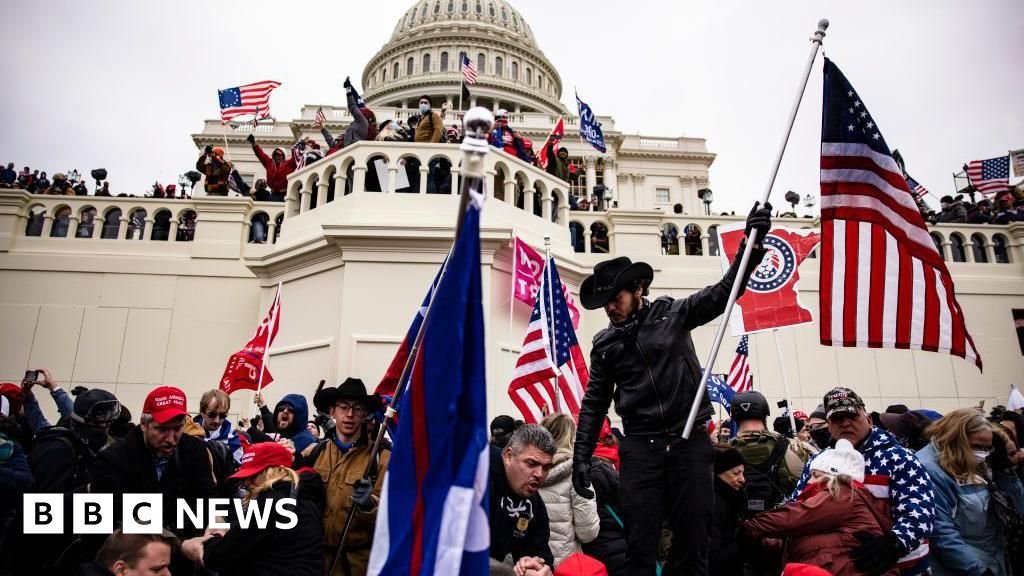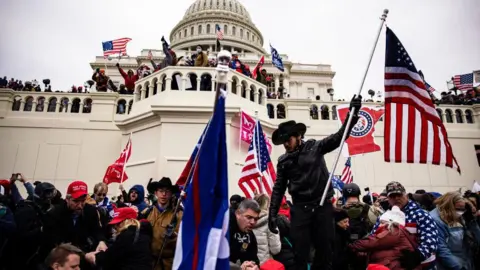
 Getty Images
Getty ImagesDonald Trump’s alleged attempts to overturn his 2020 election defeat are laid out in the final report of the special counsel who spent two years investigating him.
Much of the report’s 140 pages are already known thanks to a 2022 congressional investigation and previous court documents filed by the report’s author, Jack Smith.
But it sheds new light on some of the evidence Smith’s team uncovered and outlines his own thoughts on some more nuanced legal points.
Trump, who returns to the White House next week, immediately responded to the report’s release, insisting he was innocent and calling Smith “unhinged.”
Here are five takeaways from the report.
1. Smith says Trump encourages violence
The report talks about the riot at the U.S. Capitol on January 6, 2021, when Trump supporters broke into the Capitol after hearing defeated candidate Trump speak from the Ellipse in Washington, D.C. Attempts to block certification of Biden’s victory.
“Mr. Trump’s rhetoric inspired his supporters to commit physical violence,” the report said.
The article goes on to note: “While Mr. Trump at one point told his supporters to ‘make[their]voices peacefully and patriotically,’ he used the word ‘fight’ more than a dozen times in his speech.”
Trump has vowed to pardon many people convicted of the riots when he returns to office, and he has sought to reframe the riots as a “day of love.”
His defenders rejected the idea that he deliberately incited the crowd, pointing to Smith’s “peaceful” quote highlighted above.
2. But he was not charged with incitement
The report lays out the basis for Trump’s indictment, making clear that Smith’s team considered bringing “incitement of insurrection” charges against the then-president.
The filing states that Trump’s speech on the Ellipse on January 6, 2021, may meet the Supreme Court’s definition of incitement, especially when viewed alongside his “lengthy and deceptive voter fraud narrative.”
For example, the report suggested that the day’s violence was “predictable” to Trump and that he sought to “exploit” them to delay Biden’s certification.
But Trump was not ultimately charged with incitement because Smith’s team found no “direct evidence” that he intended to trigger “all-out violence” during the Capitol riot, making a conviction uncertain.
The document further states that there are “additional strong allegations.”
3. Rioters say they were there because of Trump’s instructions
Several men charged and convicted in connection with the Capitol attack cited Trump’s influence as a motivating factor, the report said.
It quoted some of the rioters, including Alex Harkrid, who was seeking to be released from prison ahead of his trial, saying “like thousands of others” he was only “responding to Trump’s pleas” .
Another man, David Mehaffi, cited Trump’s speech in seeking a commutation, adding: “I trust the president, but this is a big mistake.”
What Smith failed to acknowledge in his report was that these men had a legitimate interest in shifting blame away from themselves.
4. He’s been pressuring Mike Pence for weeks to no avail
Smith’s report noted that in repeated conversations day after day, Trump asked his vice president to use his ministerial position as Senate president to change the outcome of the election by not certifying the results.
Pence refused, and at one point, Trump told him that “hundreds of thousands of people” would “hate him to the core” if he didn’t concede.
The pressure campaign against his deputies continues in the open. Trump said in a speech that he hoped Pence would do that, but if he didn’t, “I wouldn’t like him that much.”
Smith said Trump made his final call to Pence just before the attack on the Capitol and before leaving the White House to deliver a speech in the Ellipse. When the vice president told him on the call that he had no authority to grant Trump’s wishes, Trump told staff to reinsert some of the language he had previously drafted against Pence into his speech.
Shortly after the speech, Trump supporters wandered the hallways of the Capitol, chanting “Hang Mike Pence” and searching for his office.
5. Telling stories about police trauma
Smith outlined his experience as a law enforcement officer as rioters stormed the Capitol, during which at least 140 officers were attacked.
The report states that 123 defendants were subsequently charged with using a deadly or dangerous weapon or causing serious bodily harm to a law enforcement officer.
“This violence takes a lasting toll,” the report said, highlighting that 223 police officers suffered “‘invisible harm,’ including depression and other forms of psychological trauma.”
A footnote further described the officers’ feelings of “survivor’s guilt,” “shell shock” and “the inability to move on from that day.”










